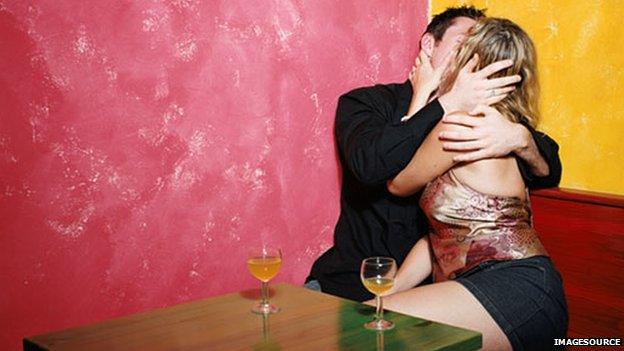Sexual consent: Knowing when no means no
- Published

Players at Brighton and Hove Albion have taken a break from football training to learn about sexual consent.
The Championship side is one of the first clubs to teach its male and female players about the laws and ethics of sexual contact.
The Protect, Inform and Prevent (PIP) programme is led by Maggie Ellis, who's the founder of rape crisis charity Life Centre.
She's been talking to Newsbeat about what everyone should bear in mind before sex.

Maggie Ellis is the founder of rape crisis charity Life Centre.
1. Be aware of the other person
"The Crown Prosecution Service says, 'a person consents if she or he agrees by choice and has the freedom and capacity to make that choice'.
"This means, we have to take care that the person we want to have sex with has the freedom and capacity to consent to every aspect of the act.
"This can be influenced by things like drugs, alcohol, disability, age, whether they are asleep or the threat of violence."
2. 'Yes' doesn't always mean 'yes'
"There is a point at which a person may be deemed by a jury to no longer have the capacity to consent because of the amount of alcohol they have drunk.
"Even if they have verbally or otherwise said 'yes' to sex, the jury may still decide a person is guilty because the person they were having sex with was incapacitated with alcohol.
"You can't pin it down to units of alcohol because everyone has a different level of what they can tolerate. You need to decide whether this person is able to make a clear decision.
"It is shocking these training sessions are needed, but we have a huge problem with alcohol in our society. I'm not saying all sexual offences are created by alcohol, but a very high percentage of them are."
3. Do they know what is happening?
"It is a crime to have sex with someone who is asleep because they are not consenting in that moment, even if they are an ongoing sexual partner and in other moments they do consent."
4. How old are they?
"The legal age to have sex with someone is 16-years-old.
"If someone under the age of 18 has sex with someone in a position of trust to them e.g. teacher, football coach, then it is a criminal offence, even if they were consenting."
5. Advice to women
"Our training sessions for women look at what could makes them vulnerable to a sexual crime e.g. alcohol, drinks being spiked, grooming.
"It is a message of empowerment. We don't want to restrict their lives or how they socialise, we just want them to think about ways they can live their lives in a safe way."
6. The bottom line
"What you always need to remember is that even if you have asked for someone's consent and they have given it, it doesn't always mean that that is enough.
"As soon as someone becomes too incapacitated to make a decision e.g. they are drunk, then by law it can be viewed as rape."
Help on consent and relationships is available at BBC Advice.
Follow @BBCNewsbeat, external on Twitter, BBCNewsbeat, external on Instagram and Radio1Newsbeat, external on YouTube